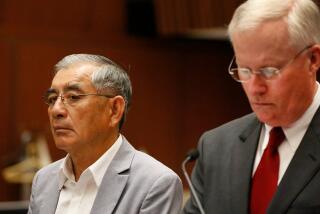Spy Case Link Alleged
- Share via
The case of a Los Angeles-based FBI agent accused of tipping off a suspected Chinese spy may be linked to the high-profile prosecution of veteran counterintelligence officer James J. Smith and his longtime lover, Katrina Leung, according to recently unsealed court records.
In the most recent allegation of misconduct within the bureau’s Chinese counterintelligence squad, Denise K. Woo has been charged with revealing the identify of an undercover operative and the existence of a wiretap and lying about it to her superiors.
Woo’s lawyers contend she acted to prevent a travesty of justice against a family friend who was wrongly suspected of passing defense secrets to China.
They say she raised “substantial concerns” about the reliability of the undercover operative but that her warnings were ignored.
No charges were ever brought against the suspect, but Woo was fired and subsequently indicted for her alleged misconduct.
According to the newly released documents, Smith oversaw the 1999 investigation and vouched for the undercover operative’s reliability.
Smith, now retired, was indicted in 2003 on charges of covering up information that Leung might have been a double-agent employed by China. In a deal with prosecutors, he pleaded guilty to a reduced charge of lying about his extramarital affair and is awaiting sentencing.
Leung, who denied any wrongdoing, was charged with illegally possessing classified materials with intent to harm U.S. interests. A federal judge later dismissed the case against her, citing alleged government misconduct.
In court briefs now part of the public file, Woo’s attorney, Mark Holscher, said his client’s defense at trial “will relate directly to the facts, events and schemes at issue in the Leung and Smith cases.”
Those briefs and other documents filed by the defense and prosecution had been sealed at the government’s request. Acting on a motion brought by the Los Angeles Times, the Los Angeles Daily Journal and the Riverside Press-Enterprise, U.S. District Judge R. Gary Klausner last week ordered the case file unsealed.
In the unsealed file, Assistant U.S. Atty. Alicia Villarreal challenged Holscher’s attempt to link the Woo case to Smith and Leung. She denied that Smith ever supervised Woo directly or that he had extensive contacts with her during the investigation.
Smith’s management of the China squad and his overall supervision of the case “is irrelevant to the issues in this prosecution,” Villarreal added.
If Woo questioned the investigation’s legitimacy, Villarreal said, she should have pursued the matter through the FBI’s chain of command.
While Klausner unsealed most of the file, he kept under wraps the contents of a plea agreement that Woo allegedly signed last November and then withdrew in a dispute over the facts in the case.
According to the now-unsealed records, federal prosecutors recently asked Klausner for permission to use the withdrawn plea agreement at trial. Klausner rejected the motion. The government has filed a notice of appeal.
The defense, meanwhile, attempted unsuccessfully to have the case transferred from Klausner to U.S. District Judge Florence-Marie Cooper, who presided over the Smith and Leung cases.
Ultimately, Cooper declined to take the case, saying the issues were not related to those contained in the Leung and Smith prosecutions.
But in his attempt to show the three cases were related, defense attorney Holscher contended Smith directly oversaw the investigation to which Woo was assigned.
Smith, he wrote in a brief, approved Woo’s assignment, dealt directly with her on numerous occasions and vouched for the credibility of the undercover operative.
More to Read
Sign up for Essential California
The most important California stories and recommendations in your inbox every morning.
You may occasionally receive promotional content from the Los Angeles Times.













